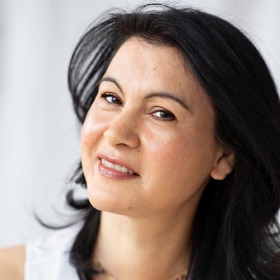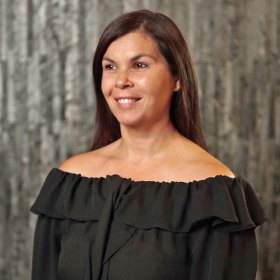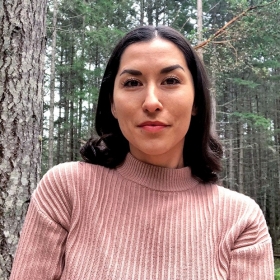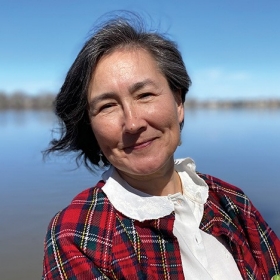Nakuset, BA 00, fights hard so Montreal’s Indigenous population can access critical services. The Concordia graduate was adopted during the Sixties Scoop — when Canadian child-welfare authorities were empowered to arbitrarily remove Indigenous children from their families and place them in foster homes for subsequent adoption by white people.
Nakuset, who is Cree from Lac La Ronge, Treaty 6 territory, Saskatchewan, was placed with a Jewish family in Montreal. As was typical at the time, her Indigenous roots were downplayed and denigrated.
“Most of the adoptions failed,” she says of that era, but she credits a caring adoptive grandmother for giving her strength and love. (One of Nakuset’s early professional projects was to create a cultural manual for white families who adopt Indigenous children, as well as an Indigenous program modelled after Big Brothers Big Sisters.)
While doing support work at the Native Friendship Centre of Montreal three decades ago, Nakuset was appalled by the lack of available resources.
“There were people falling through the cracks — homeless people who were suffering from the effects of residential schools or the Sixties Scoop,” she says. “No one seemed to care.”
Nakuset soon enrolled in Concordia’s Department of Applied Human Sciences to figure out how to create solutions. While a student, she joined the Native Women’s Shelter as a front-line worker and rose to become executive director. She has since developed many projects and programs, from health- and family-care services to advocacy and support-system guidance. Notably, next February Nakuset will open Miyoskamin, a second-stage housing program and social pediatric clinic for women and their children.
But progress is never linear amid the persistent obstacles of systemic racism. In 2018, when homeless shelter Open Door left the Cabot Square area of downtown Montreal, eight Indigenous people died in the subsequent three months.
“They couldn’t get access to services, they were turned away from hospitals, they had nowhere to sleep,” says Nakuset. “I was so outraged — how many Indigenous people have to die before someone does something?”
When the city decided to revitalize the neighbourhood, Nakuset urged officials not to remove people from the park and to provide them with services. Media publicity led to a financial commitment, and she stepped forward to help create the wellness centre Resilience Montreal.
Currently in a temporary location — with a permanent one to be announced soon — the centre has already brought relief and hope to the Indigenous community. Nakuset anticipates handing the reins over to co-founder David Chapman within a few years.
“You have to keep sounding the alarm as injustices happen, and hope that it will inspire others to do better,” Nakuset says of her approach to fighting for positive change. “Present yourself as fearless, even when you’re scared. But always surround yourself with good people who believe in you and support you.”
 “Present yourself as fearless, even when you’re scared. But surround yourself with good people who believe in you and support you.” | Photo: Marie-Claude Fournier
“Present yourself as fearless, even when you’re scared. But surround yourself with good people who believe in you and support you.” | Photo: Marie-Claude Fournier
 “The stories we tell are sacred. They’re generational, they’re ancestral, they harness a lot of culture and Indigenous knowledge and identity, which is a huge responsibility.”
“The stories we tell are sacred. They’re generational, they’re ancestral, they harness a lot of culture and Indigenous knowledge and identity, which is a huge responsibility.”
 The best advice Camille Usher has received about leadership is to not take conflicts personally, and to look at each situation logically.
The best advice Camille Usher has received about leadership is to not take conflicts personally, and to look at each situation logically.
 “Being a woman and a leader requires commitment and fortitude. You don’t gain that fortitude alone. You need to surround yourself with good people.”
“Being a woman and a leader requires commitment and fortitude. You don’t gain that fortitude alone. You need to surround yourself with good people.”